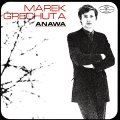Information
Shop
Search
Catalog
- Recommendations
- Coming soon
- New in stock
- Back in stock
- ABC-Lists CDs
- ABC-Lists LPs
- List of all items CDs
- List of all items LPs
Order

Grechuta, Marek & Anawa
Marek Grechuta & Anawa
- Format: CD
- Band: Grechuta, Marek & Anawa
- Title: Marek Grechuta & Anawa
- Band's Origin: PL
- Style: Folkrock
- Rating: 3
- Release Year: 2023
- Recording Year: 1969-1970
- Production Year: 1970/2023
- Record Company: Warner Music Poland
- Item's Number: 50541 9 78085 4 8
- Color of the Label:
- Edition:
- Extras: Super Audio CD
- EAN: 5054197808548
- Weight: 110 g
- Visual: new
- Acoustic:
- Cover: new
Warner Music Poland Release Information
The album “Marek Grechuta & Anawa” (SACD Hybrid) by Marek Grechuta & Anawa in a limited edition, in the series “Polskie Nagrania Catalogue Selections”. This is the first edition of this album in the SACD (Super Audio Compact Disc) format. The choice of this format is a nod to audiophiles.
The album “Marek Grechuta & Anawa” is the debut album by Marek Grechuta and the group Anawa, recorded and released in 1970. It contains ten songs, most of which became hits. We all know songs such as: “Nie dokazuj” (Don’t Tease), “Będziesz moją panią” (You Will Be My Mistress), “Niepewność” (Uncertainty), “Twoja postać” (Your Character), “Serce” (Heart), “Wesele” (Wedding), “W dzikie wino zaplątani” (In Wild Wine Entangled). There are lyrics by Wyspianski, Tuwim, Mickiewicz, Przyboś, but also by Marek Grechuta himself.
“Marek Grechuta & Anawa” is undoubtedly one of the most important albums of Polish pop music. These songs are unaffected by time – successive generations admire their melodiousness, mood and mastery of performance.
The great artistic journey of Marek Grechuta, singer, composer and poet, began – as befits him – in Kraków (Cracow). It was there, at the Faculty of Architecture of the Cracow University of Technology, that the student from Zamość (born in 1945) met his slightly older colleague, Jan Kanty Pawluśkiewicz (born in 1942 in Nowy Targ). The two enthusiasts of poetry and music – Pawluśkiewicz already had a stint as a jazz pianist – founded the Anawa cabaret. The name derives from the French phrase “en avant” (forward).
The group began in December 1966 with grotesque and fairy-tale-like performances in the convention of happenings, but after just a few months, it transformed into a musical group with an entirely unconventional line-up. The formula created by Anawa finds no comparison in Polish or world music. Rich, unpredictable compositions, full of unexpected melodic turns, found a worthy setting in the playing of a trio, then a string quartet. Anawa’s style was close to classical music forms, but the introduction of guitar and percussion extended the possibilities of arranging to an unusual composition. Grechuta and Pawluśkiewicz took full advantage of these possibilities.
Following the success of their early works (including a TVP award for “Wesele” (Wedding) – Opole 1969), the group recorded a first single, which included, alongside “Tango Anawa” (a showpiece song), “Niepewność” (Uncertainty) to Mickiewicz’s poem and “Serce” (Heart). Pawluśkiewicz’s compositions, initially the main author of the music, shaped Anawa’s image as a “neo-romantic” band, boldly reaching for the words of the classical and shocking big-beat audiences with almost everything – from their instrumentation to their appearance (the cellist’s dress and... tailcoats). The key to the success of the new musical formula, however, were Grechuta’s interpretations – nobody sang like him. The press called him “a new romantic”, “a master of mood”, “the prince of poetic songs”.
But the master Jan Kanty did not shy away from thoroughly modern poetry, as can be seen in “Piosenka” (Song) to a poem by Julian Przyboś, which is as “futuristic’ in its exploding strings as the poet’s words. He was also able to create lyrical miniatures closer to the canon of popular music, such as “Zadymka” (Blizzard) to Tuwim’s stanzas. His songs to Grechuta’s subversive, pugnacious lyrics – the cabaret songs “Nie dokazuj” (Don’t Tease) and “W dzikie wino zaplątani” (In Wild Wine Entangled) with words that are indeed “entangled” like vines – were a separate category.
Of the three songs with Grechuta’s music, the stand-out one (not only featuring Alibabki) is “Wesele” (Wedding), a song written to fragments of a drama by Stanisław Wyspiański. Already in this – almost debut – composition, the artist’s natural freedom in attributing difficult music to difficult text is evident. But the respect for the text is not idolatrous. The structure of “Twoja postać” (Your Character) required a greater contrast of moods than in Miciński’s poem, so the composer reached for stanzas by another poet. Thus, Czechowicz’s “bright streaks” illuminate Miciński’s dark images, and the mood is enriched by Tadeusz Wozniak’s guitar arpeggios. “Będziesz moją panią” (You Will Be My Mistress) is a song with an almost folk character – accentuated by the simplicity of the comparisons and the use of the accordion in the accompaniment. It is also Grechuta’s first “author’s song” – there will be more to come.
The album “Marek Grechuta & Anawa” closes with a composition by Jan Kanty different from the others, seemingly devoid of a melodic line, but with an exposed rhythm (also here we hear Tadeusz Woźniak’s guitar). It is the only song on the album to words by the poet-peer Leszek A. Moczulski. However, his words turned out to be so important that Marek Grechuta decided to give them his own musical setting, creating the title composition of his next long-playing album.
The additional recording, “Tango Anawa”, which was not included on the 1970 LP, was added to this edition.
Tracklist
1. Wesele 3:16
2. Twoja postać 3:44
3. W dzikie wino zaplątani 2:58
4. Niepewność 3:18
5. Piosenka 4:53
6. Zadymka 1:57
7. Będziesz moją panią 1:44
8. Nie dokazuj 3:59
9. Serce 5:00
10. Korowód 2:50
Bonus:
11. Tango Anawa 2:07


